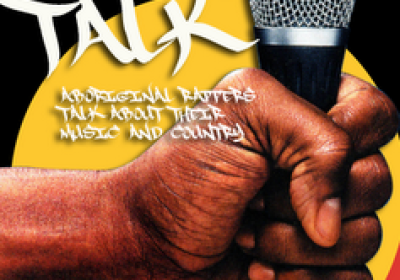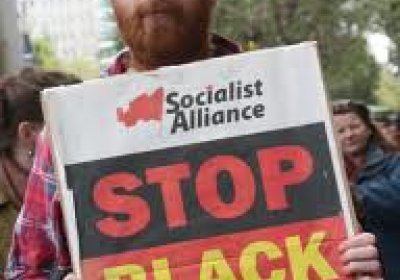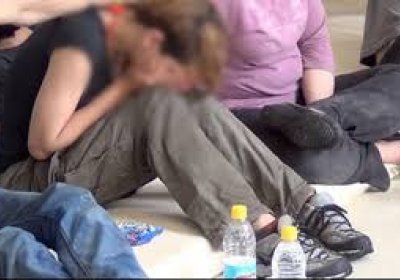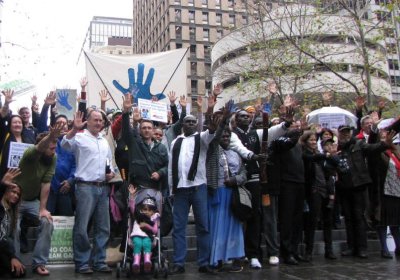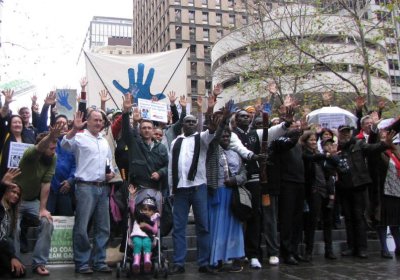Real Talk: Aboriginal Rappers Talk About Their Music & Country
By Mat Ward
100 pages
Download for free
Australian hip-hop pioneer Urthboy told The Music Network last year: “I was asked to write about the state of hip-hop in Australia. I’d prefer to shine a light on what may be the future of it: Indigenous Hip-Hop.
“Indigenous artists carry a profoundly engrossing and intriguing story for international audiences, yet it’s barely understood by many Australians.”
Indigenous
Aboriginal Australians awoke on Sunday morning to find they had a new “Prime Minister for Indigenous Affairs”, a pledge Tony Abbott delivered during the 2013 election campaign.
One problem — noone, including within the media, ever stopped to ask Aboriginal people if they actually wanted a “Prime Minister for Indigenous Affairs”, and in particular whether they wanted Abbott.
As it turns out, they apparently don’t.
The Australian government has made it clear that it will not offer consular help to activists on the West Papua Freedom Flotilla if they are arrested by Papua New Guinea NG or Indonesian authorities.
The flotilla is expected to enter Indonesian territory early next month. Carrying West Papuan and Australian Aboriginal activists, its aim is to raise awareness about the occupation of West Papua by Indonesia.
Asylum seekers are welcome on Aboriginal lands in Australia despite the inhumane approach of both major political parties, the Aboriginal Provisional Government said on July 29.
Secretary Michael Mansell said: “As people who know what it’s like to be invaded by boat people we are in a better position to judge how the current boat people should be treated. Where the original boat people who took over our country were armed to the teeth and bent on conquest, asylum seekers in 2013 are unarmed and seeking sanctuary.
About sixty people attended a meeting on “America’s Pacific Push” on July 25.
Bruce Gagnon, coordinator of the Global Network Against Weapons and Nuclear Power in Space, spoke about the growing US military presence in the Pacific.
Examples included the expansion of a missile test range in Hawaii, the building of a naval base on South Korea’s Jeju Island despite strong resistance from local people, and the plan to station 2500 US troops in Darwin.
Gagnon said that US bases in Australia play a crucial role in US military strategy.
The Koori community and supporters rallied on the historic Redfern Block in on August 3 to show their solidarity with Trayvon Martin, the young black man who was followed and shot by a neighbourhood watch volunteer in Florida, and to oppose racism and racial profiling anywhere in the world.
The action was organised by Koori community activists Chris Bonney and Dan Munro. Bonney told Green Left WeeklyIt is 2013 and I don't want my children to grow up experiencing the racism all us Kooris experience today. It is not right in the United States and it is not right in Australia."
"Thirty Years But Still No Justice!" was the theme of an Aboriginal deaths in custody forum held in Redfern on July 27. Speakers addressed issues of deaths in custody, victims of police brutality and other social justice concerns.
The forum was also the Sydney launch of the National Deaths in Custody Coalition (NDCC), established in February this year to organise for a national day of action on Saturday, September 28 to mark 30 years since the death at police hands of WA Aboriginal youth John Pat in 1983. The meeting was sponsored by the Indigenous Social Justice Association.
The election campaign in Australia is being fought with the lives of men, women and children.
Some drown, others are banished without hope to malarial camps. Children are incarcerated behind razor wire in conditions described as "a huge generator of mental illness". This barbarism is considered a vote-winner by both the Australian government and opposition.
Reminiscent of the closing of borders to Jews in the 1930s, it is smashing the facade of a society advertised as benign and lucky.
Read More:
The election of the United States’ first black president was one of those moments. Most of us remember where we were when we first heard about it.
I happened to be on Palm Island, a small community off the coast of Townsville, now home to more than 3000 Aboriginal people from different corners of Queensland. "Palm" is a former black penal colony, and to get sent there you had to commit such heinous crimes as refusing to stop speaking your native tongue, or getting caught hanging around a white Queensland town.
"We don't want oil or gas mining in our country,” Aboriginal traditional owner Eddie Mason, based in Maningrida, a community in eastern Arnhem Land, told a rally in Sydney on July 19. “We are protecting our land and sea rights."
About 100 people rallied with visiting Arnhem Land residents outside the offices of US-based oil exploration company Paltar Petroleum.
"We are saying no to Paltar,” Mason said. “We don't want exploration destroying our land and waters. You are welcome to visit our country, but don't destroy it.
This statement was released on July 19 by the Protect Arnhem Land community group, based in Maningrida, Northern Territory; The Wilderness Society; the Environment Centre NT; and the Australian Marine Conservation Society.
***
Arnhem Land traditional owners have forced US oil and gas company Paltar to meet with them by travelling to the firm’s Australian headquarters in Sydney.
Paltar had steadfastly refused to talk to the traditional owners about its near-shore drilling plans that threaten their food, water and culture.
More than 100 people attended a lively forum at Glebe Town Hall on July 9 on the topic of "Recognition of Aboriginal and Torres Strait Islander Peoples in the Constitution."
The forum was organised by RECOGNISE and the Glebe NAIDOC Committee, as part of the National Aboriginal and Islander Day of Commemoration (NAIDOC) Week celebrations.
- Previous page
- Page 86
- Next page
